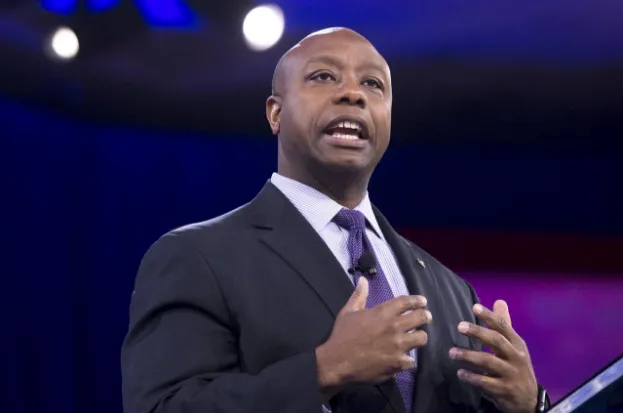Table of Contents
This morning, Senator Tim Scott announced his campaign for President after forming an exploratory committee last month, highlighting the growing divide in the GOP between President Trump and his challengers. However, Scott’s candidacy especially marks a regression to the weak, valueless Republican establishment that continuously gives in to the woke mob.
In September 2017, President Trump nominated US Attorney and former Review Cycle Editor Ryan Bounds (‘95) to the Ninth Circuit Court of Appeals. In July 2018, nearly a full year after Bounds’ nomination, Senator Scott single handedly derailed Bounds’ confirmation, citing his writings in the Review. Scott’s actions to keep a brilliant conservative thinker and writer off the bench for “overheated” collegiate writings is a grave indicator of the Senator’s willingness to cede to the cultural leftists.
Before Scott turned his back on the GOP, Bounds suffered difficulties getting approval from his home state of Oregon’s two Democratic senators, Ron Wyden and Jeff Merkley. Also citing Bounds’ Review articles, Wyden and Merkley refused to return the ‘blue slips’ necessary for the judicial confirmation process. Wielding a lengthy resistance to Bounds’ nomination is to be expected for hard-left Democratic politicians whose end goal is preventing a conservative judiciary. Senator Scott following their playbook is both a classic promotion of the self over the movement and a sign of ideological weakness—both traits that should disqualify him from becoming the Republican presidential nominee.
Bounds’ writings in the Review are far from intolerant. His articles threatened orthodoxy about leftist segregation and articulated the victim-complex from which many in minority groups suffer today, especially on college campuses. Considering the intense infighting that occurs within Stanford’s ‘oppressed’ communities scrounging for sympathy about not being represented enough, his writings ought to be considered prophetic. One article of his even challenged the ‘guilty-until-proven-innocent’ orthodoxy that now dominates discussions about sexual assault. Though there is nothing particularly controversial about his positions—ones that are held by a large number of Americans—Scott played into leftist fear-mongering by ‘canceling’ Bounds for his decades-old writings.
Although he never reneged his views, Bounds was forced to apologize for what he called “overheated” and “overbroad” rhetoric. Despite this, on July 19, 2018, Senator Scott announced that he would refuse to vote for Bounds’ confirmation. Shortly after, then-Majority Leader Mitch McConnell announced that Bounds’ nomination would be withdrawn due to a lack of necessary support. Though the Republicans controlled the Senate—and were in a position to promote conservative doctrine via the courts—Scott abandoned the Republicans and was the ultimate reason for Bounds’ failed nomination.
When progressives are in control of nearly every important institution in the United States, conservative infighting is counterproductive, tacky, and removes the focus from many important issues that require attention. Figures like Scott or Marco Rubio—who followed Scott’s protest against Bounds—end up playing into the hands of Democrats by weakly trying to cannibalize their own kin at the cost of a few marginal voters who didn’t like them anyway. Republicans need to stick together.
This isn’t the first time that Scott expressed a position that is antithetical to the conservative movement. His recent inability to articulate a coherent position on abortion reeks of the “second place conservatism” that is capable of very little beyond empty rhetoric. Only Scott knows whether his preference for heterodoxy is an expression of legitimate political conviction or an attempt to save face with the Democrat party. Regardless, what is clear is that he does not belong at the helm of the GOP, or the country.
Buckling under the pressure of the left’s witch hunt rhetoric does not bode well for the future of conservative politics. Those with conservative sensibilities should not support politicians like Scott who flinch at the first signs of conflict. If conservatives keep giving ground when it comes to cases like Bounds’, soon there will be little left to conserve.








